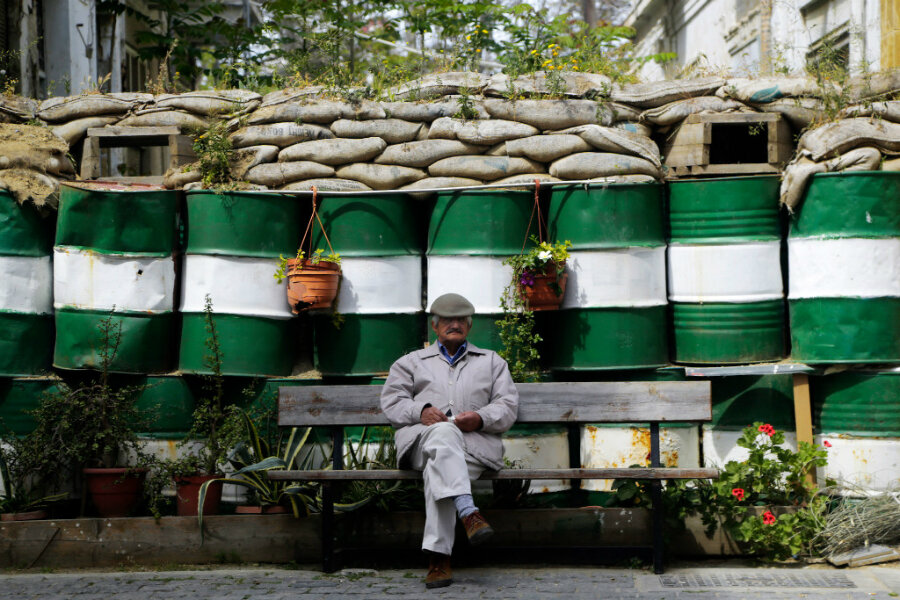Can a divided Cyprus finally be unified? Peace summit begins this week
Loading...
| Nicosia, Cyprus
It's back to Switzerland for Cyprus peace talks.
This time the rival leaders of the ethnically-divided island will be meeting at the secluded Swiss resort of Crans-Montana. Previous summits were held in Mont Pelerin and Geneva.
The talks kick off Wednesday and are due to last at least a week. They will likely determine whether a deal to reunify Cyprus, which is divided into a breakaway Turkish Cypriot north and an internationally recognized Greek Cypriot south, is possible or not.
The key issue is how security will be overseen if and when Cyprus is reunified as a federation. Other issues still to be resolved include how much territory the Greek and Turkish Cypriot federated states would be made up of and the process for allowing tens of thousands of displaced people to reclaim lost homes and property.
Here's a look at what will be at play at the peace summit:
Military muscle
The issue is one of the toughest in the complex negotiations that officials say have made significant headway in the last two years and has been left to be tackled last.
It revolves around the 35,000-plus troops that Turkey has kept in place since 1974 when it invaded Cyprus following a coup aimed at union with Greece. Turkey mounted the military action, invoking intervention rights that were granted under Cyprus' 1960 constitution to the island's "guarantors": Turkey, Greece, and ex-colonial ruler Britain.
Cyprus' Greek Cypriot president, Nicos Anastasiades, and the leader of the Turkish Cypriots, Mustafa Akinci, both tackled the security conundrum in Geneva during January talks. The foreign ministers of the "guarantor" nations also took part.
But that meeting dissolved relatively quickly amid recriminations that neither side was unwilling to put its cards on the table and get down to hard bargaining.
Troops, no troops
The Greek Cypriot side wants military intervention rights expunged and Turkish troops gone to eliminate what is sees as an existential threat and Ankara's instrument of control over the island. Its argument is that no European Union member country would ever need third-country security guarantees.
Anastasiades has proposed an international police force to oversee post-reunification security with the UN Security Council using its clout to back it up.
The minority Turkish Cypriots see Turkey's troops as their sole assurance of protection in case a peace deal unravels and want them to stay.
Akinci has said a rethink over the need for troops could happen around 15 years after reunification. Turkish Cypriot and Turkish officials insist a Greek Cypriot call for a full troop withdrawal is a non-starter.
An alternative proposal that's been floated unofficially would see small contingents of Greek and Turkish troops deployed on the island after a deal, while intervention rights would be amended to remove any clause for unilateral action.
Go-between
Any compromise on security must pass muster with Greek and Turkish Cypriots who will vote on any peace accord in separate referendums before it would be implemented.
UN envoy Espen Barth Eide told The Associated Press in April that the world body has helped put together a compromise formula to overcome the security hurdle. He said the formula was the result of consultation with the Cypriot leaders, the EU and the "guarantors."
The Greek Cypriot side has insisted on prioritizing a security deal before other issues are tackled. Turkish Cypriots said all issues must be discussed concurrently as part of an overarching bartering process.
To accommodate both sides, negotiations at Crans-Montana will be split into two rooms – security in one, and everything else in the other.
Timing is everything
The aim at Crans-Montana is for the two sides to achieve a breakthrough on an agreed peace accord framework. More work will be needed over the weeks and months ahead to fill in the gaps and prepare the ground for putting the completed deal to a vote.
Although it's said the talks will be open-ended, officials say it'll likely last a week to 10 days. And timing is essential.
The Cyprus government is set to start promising exploratory oil and gas drilling off the island's southern shore in mid-July amid strong opposition from Turkey, and the Turkish Cypriots who warn of a potential "crisis" if drilling proceeds.
Turkey and the Turkish Cypriots say a "unilateral" Greek Cypriot search for gas flouts their rights to the island's offshore mineral wealth. The Cypriot government insists drilling is it's sovereign right and that any hydrocarbon proceeds will be shared after a peace deal is sealed, signed and delivered.







